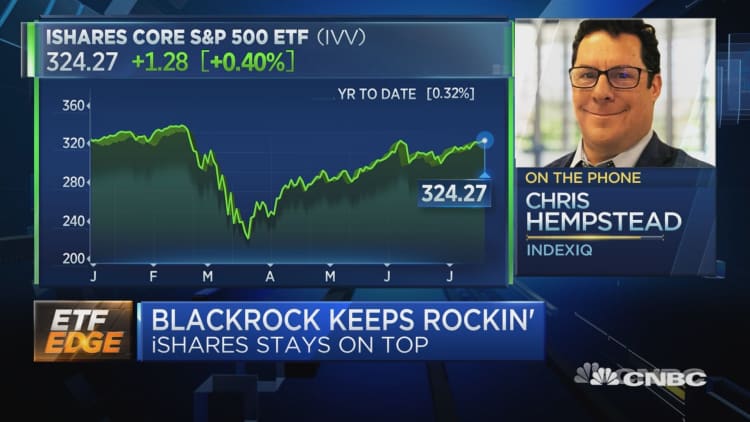
BlackRock is still rockin'.
The largest asset manager in the world reported a 21% increase in quarterly profit last week fueled by investor interest in its fixed-income and cash management services. With its iShares brand, it remains the biggest ETF provider in the business for both passive and actively managed funds.
Industrywide fee cuts have helped BlackRock maintain its dominance in the ETF space, Chris Hempstead, director of institutional business development at IndexIQ, told CNBC's "ETF Edge" on Monday.
"It's unbelievable, and it's great. It's great news for you and I and ... everyone else listening," he said.
In late June, iShares cut fees on three of its prominent ETFs, including the popular iShares Core S&P 500 ETF (IVV). The cost of owning IVV — 3 basis points, or what would amount to $3 on a $10,000 investment — now matches that of Vanguard's S&P 500 ETF (VOO).
"IShares and Vanguard, they fight it out hard. I make the reference a lot of times to Formula One. It's Mercedes versus Ferrari," Hempstead said. "You've got the top two performers there in terms of asset growth, but then there's a pretty big field of other ETF issuers who are fighting for maybe not so much the lion's share of the assets, but fighting more for performance metrics, for a way to diversify away from a broader index like S&P."
That includes firms such as Ark Invest, which is known for its ultra-bullish stance on the stock of Tesla. So far in 2020, Ark's assets under management have climbed 67%, according to New York Life, compared with a 3% increase for iShares and a 7% boost for Vanguard.
Even so, the top five ETF families — iShares, Vanguard, State Street, Invesco and Charles Schwab — still account for about 90% of the industry's assets under management.
For Hempstead, there's a clear difference between the biggest asset managers and the ones fighting to be the best.
"A lot of it comes down to alpha generation above and beyond the core allocation. So, how are managers, advisors and wealth managers differentiating their clients' portfolios?" he said.
"They're going to always have a piece of those larger passive index-based products that are so heavily weighted towards iShares and Vanguard," he said. "But then when it comes to up-weighting and adding some alpha and adding some manager discretion, they're looking to people like [Ark Invest CEO] Cathie Wood and Nuveen and IndexIQ and Amplify for different ways to differentiate the portfolio and add some alpha."
Todd Rosenbluth, senior director of ETF and mutual fund research at CFRA Research, said investors shouldn't discount these midsize firms' offerings.
"JPMorgan and Pimco are doing really well within active fixed income. You've got Global X with the thematic-oriented ETFs," Rosenbluth said in the same "ETF Edge" interview. "There are certainly other players, and depending upon if you want to specialize in certain themes, you want to look besides the top two firms. There's some great firms that are out there offering compelling products."
Disclosure: Invesco is the sponsor of CNBC's "ETF Edge."





